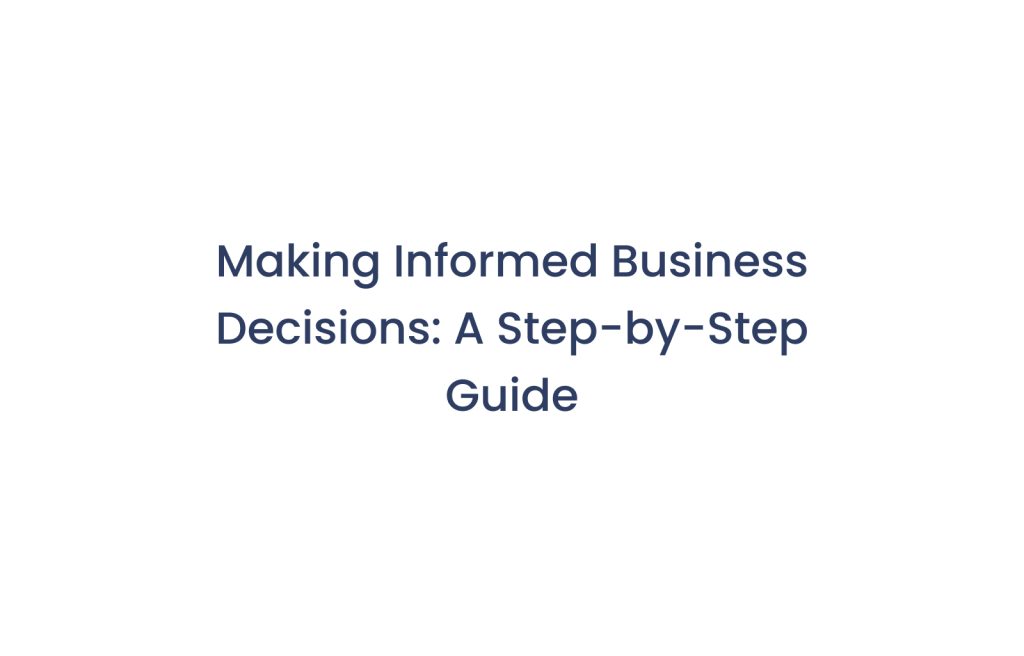Making Informed Business Decisions: A Step-by-Step Guide

In the fast-paced and competitive business world, making informed decisions is crucial for success and growth. Every choice you make as a business leader can have far-reaching consequences, impacting your company’s performance, reputation, and overall trajectory. Therefore, it’s essential to adopt a structured approach to decision-making that ensures you are well-informed and confident in your choices.
Making Informed Business Decisions: Learn how to make well-informed choices in your business with our comprehensive step-by-step guide. Empower yourself with the knowledge and tools to analyze data, assess risks, and weigh options effectively. Make confident decisions that drive success and growth for your company.

Step 1: Define the Decision
Begin by clearly defining the decision you need to make. Be specific about the problem or opportunity at hand. This step is crucial as it sets the foundation for the entire decision-making process.
Step 2: Gather Relevant Data
Accurate and up-to-date data is the backbone of informed decision-making. Collect all the relevant information related to the decision, both qualitative and quantitative. Use various sources, such as market research, customer feedback, financial reports, and industry trends, to gain comprehensive insights.
Step 3: Analyze the Data
Once you have gathered the necessary data, conduct a thorough analysis. Identify patterns, trends, and potential outcomes based on the information available. Utilize tools like SWOT analysis, cost-benefit analysis, and risk assessment to evaluate the pros and cons of each option.
Step 4: Consider Alternatives
Avoid jumping to conclusions. Instead, brainstorm and consider multiple alternatives. Involve key stakeholders and team members to gain different perspectives and innovative ideas. Evaluating a range of options will help you identify the most promising and viable solution.
Step 5: Seek Expert Advice
Don’t hesitate to seek advice from experts or industry professionals. Sometimes, an outside perspective can shed light on aspects you may have overlooked. Engage with mentors, consultants, or advisors who can offer valuable insights to strengthen your decision-making process.
Step 6: Evaluate Impact and Feasibility
Assess the potential impact of each option on your business. Consider short-term and long-term implications, as well as how each choice aligns with your company’s goals and values. Additionally, evaluate the feasibility of implementing the decision, taking into account available resources, budget constraints, and timeframes.
Step 7: Make the Decision
After careful analysis and evaluation, it’s time to make the decision. Trust the process and be confident in your choice, knowing that you have done your due diligence. Remember that no decision is entirely risk-free, but a well-informed decision significantly reduces the likelihood of negative outcomes.

Step 8: Communicate Effectively
Once the decision is made, communicate it clearly and effectively to all stakeholders involved. Transparent communication builds trust and ensures everyone is on the same page. Address any concerns or questions raised and provide a clear rationale behind the decision.
Step 9: Monitor and Adapt
The decision-making process doesn’t end after implementation. Continuously monitor the results and impact of your decision. Be prepared to adapt and make adjustments if necessary. Flexibility is vital in a dynamic business environment.
Step 10: Learn from the Process
Reflect on the decision-making process and its outcomes. Identify lessons learned and areas for improvement. Embrace both successes and failures as valuable learning opportunities to refine your decision-making skills for future challenges.
Remember that making informed business decisions is an ongoing journey of learning and improvement. By following this step-by-step guide, you’ll enhance your ability to navigate complex choices and lead your business towards sustainable success.
Business Hub for Notion
Your Business Hub, ENTIRELY in Notion. Tired of cobbling together multiple apps to form your Business? Me too. Business Hub lets you capture and organize everything inside of Notion – turning it into an all-in-one workspace.

And more business tools and resource for founders:
